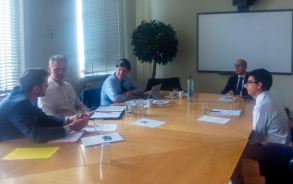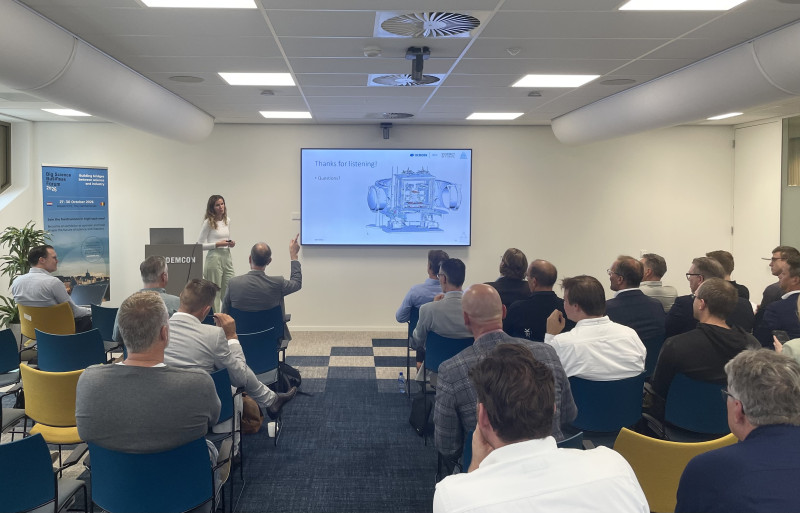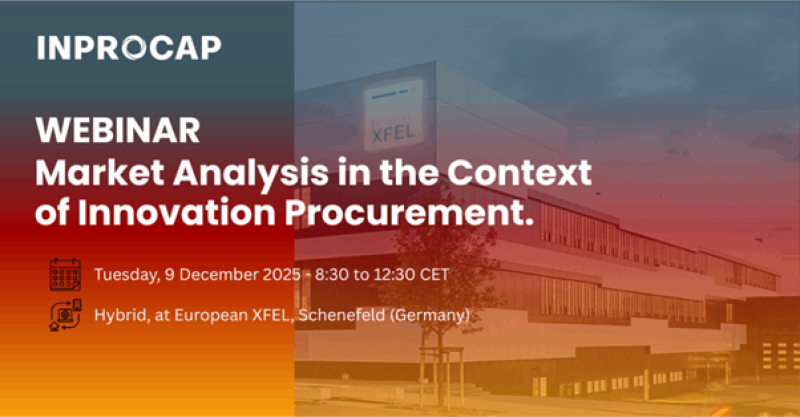Symposium Connecting Strength of Big Science
08-06-2017
Report of the conference on the future of Big Science Brussels at Neth-ER, June 8th 2017
On June 8th a one-day work conference on the future of Big Science took place, which was organized by the Dutch ILO-Net and was located at the Neth-ER-offices in Brussels. A broad audience was invited, coming from Dutch industry active in Big Science, scientific and technology institutes as well as policy makers from institutional bodies. The purpose of the conference was to raise awareness about the potential of Big Science for science, innovation and valorization and to discuss the challenges that Big Science will be confronted with in the next twenty years from the scientific, industrial, and institutional point of view.
To this end, these challenges were highlighted in four of keynotes given by consecutively Leonardo Biagioni (Head of Contracts and Procurement at Fusion for Energy, the European agency for ITER).

Hans Priem (Business Manager Science & Technology at VDL ETG), Michael Wise (Head of the Astronomy Group at ASTRON) and Markus Nordberg (Head of Resources Development of the Development and Innovation Unit at CERN).

Furthermore, Katinka Stenbjørn (Head of Section in the Danish Agency for Science and Higher Education) introduced the Big Science Business Forum (BSBF) in Copenhagen, 26- 28 February 2018).
This important initiative provides a joint platform of eight important European Big Science programmes and intends to explore the synergy between them for both industry and the agencies concerned. The presentations you can find below.
During the second half of the afternoon the conference programme had a workshop character, offering opportunities for participants to present their views on and solutions for major challenges which had been suggested by the keynote speakers. The workshop was organized using four parallel groups, primarily focusing on 2 subjects each.
 The open and active discussions in the workshop groups led to a number of useful observations and conclusions. Three high-level examples are:
The open and active discussions in the workshop groups led to a number of useful observations and conclusions. Three high-level examples are:
- Innovative SMEs play a valuable part in providing breakthrough technologies for Big Science programmes but need dedicated supporting instruments and collaboration to mitigate contractual and financial entry barriers and to enable long-term commitments
- Collaboration between industry and Big Science labs is a key factor for technology development success, but the labs should involve industrial partners from the start in order to enable harvesting the full benefits from this collaboration
- Cross-border collaboration should be stimulated as well, e.g. by dedicated collaborative European projects and a Europe-wide ILO-Net

The detailed observations and recommendations stemming from the workshops are published on our website in a separate document. In the near future we will process these conclusions further and produce a white paper presenting a strategic view and associated recommendations related to the future of Big Science. As such, we will also contribute to and prepare for the BSBF from the Dutch perspective.
Summarizing, the conference enabled us to expose the issues that are hampering the development of Big Science as we see it today. At the same time we were able to focus on a number of practical measures that can be taken to improve developments for the sake of curiosity driven science, innovation and valorization. These measures will require a careful interplay between national and European policies. Thanks to a number of excellent speakers and a lively discussion in the work
On June the 8th the Dutch ILO-net will organise a one-day work conference on the future of Big Science. The conference will be held at the Neth-ER-offices in Brussels.
If you wish to register , please fill in the registration form.
The future of Big Science is facing several challenges that will be addressed by a number of keynotes. The purpose of the conference is to raise awareness about the potential of Big Science for science, innovation and valorisation. Focus of the discussion will be the chain of innovation driven by scientific challenges. The keynotes will address the various perspectives on Big Science; from the scientific, industrial, and institutional point of view, as well as the challenges that each of these will be confronted with in the next twenty years.
The keynotes are given by representatives from CERN, ITER, SKA and Industry who will present their interesting visions on Big Science and its potential. The invited audience consists of selected Dutch companies active in Big Science, representatives from scientific institutes, policy makers and Dutch actors from the EC arena.
During the afternoon, the programme will have a workshop character, offering broad opportunities for participants to present their views on and solutions for the major challenges that will emerge.
It is our ambition to formulate conclusions and advice which can be used as input for the further development of the European framework programme, in particular KP9. This meeting can also be considered as a first step for a Dutch contribution to the European Big Science Business Forum (BSBF) meeting to be held in Copenhagen, on 26-28 February 2018. The BSBF will be introduced by a representative from the Danish organising committee on June 8th.
We would like you to join us in this work conference. Attendance is limited so we invite you to apply by clicking on the following link. You will receive a confirmation of your application after between three to five working days.
The programme One-day work conference on the future of Big Science in Brussels
10.30 – 11.00: Informal gathering
11.00 – 14.30: Key notes + invited speaker on BSBF in Copenhagen
Lunch around 12.30
Key Notes:
- Leonardo Biagioni, F4E. The evolution of Big Science, its relevance for industry and society and the potential of the synergy between Big Science programmes: why old paradigms in this field are no longer valid. The need for improved collaborations, shared technologies and synergies on a global scale. Leonardo Biagioni is Head of Contracts and Procurement at Fusion for Energy (F4). F4E is the European agency for ITER, where his service manages all supply chain activities for the European contribution to ITER and the Broader Approach agreement with Japan (including procurement, industrial policy, technology transfer, etc.). Before joining F4E he worked for many years in space industry (he was involved in several space science and exploration projects in Europe and the USA, including the International Space Station, Cassini-Huygens, LISA, Gaia, Bepi Colombo, SMART-1) and in academia, where he started his career in the fields of applied mathematics, hypersonic aerothermodynamics and plasma-dynamics.
- Hans Priem, VDL. What are the major considerations from industry to actively participate in Big Science projects? How to find the balance between acquisition and investments on the one hand and on the other hand the expected revenues in the long run. Hans Priem is Business Manager Science & Technology at VDL ETG. After having finalized his Masters in Business Economics at Tilburg University, Hans started his career with ASML. Based on his experience within Finance and Product Management, he joined Assembleon to assume responsibility over the company's Installed Base Business. Since 2011 , Hans is with VDL ETG. He is, as part of VDL's company business development activities, responsible for building VDL ETG’s Science & Technology-related business, all based on VDLs ultra-precision machining & metrology, vacuum, and handling competences.
- Michael Wise, ASTRON. SKA as an example of a Big Science project. Pro's and con's of a decentralized model. How to optimally organize large infrastructures? Lessons learned from the development of SKA. Dr. Michael Wise is Head of the Astronomy Group at ASTRON and an adjunct professor in Radio Astronomy at the University of Amsterdam. He is an active research astronomer whose interests include galaxies, black holes, and the formation and evolution of large-scale structure in the universe. Along with fundamental astronomical research, his interests include a variety of topics in data-intensive astronomy. He also has over 20 years of experience supporting the construction and operation of large-scale astronomical facilities, such as the Chandra X-ray Science Center, the LOFAR telescope, and now the SKA. He is President of IAU Commission B2 on Data and Documentation and a member of the international SKA coordination group. Within Europe, he is coordinator for the H2020 project AENEAS to establish a distributed science data centre to allow the astronomical community to extract scientific results from the exascale data sets the SKA will produce.
- Markus Nordberg, CERN. How to organize and support large collaborations in Big Science endeavours during many years, maintaining the innovation chain, and assuring spin-off and technology transfer along the way. Dr. MARKUS NORDBERG is the Head of Resources Development of the Development and Innovation Unit at CERN, Switzerland. He is currently involved in launching a sensor and imaging R&D initiative called ATTRACT (www.attract-eu.org) aiming at both scientific and societal impact. He also manages the related IdeaSquare initiative at CERN (cern.ch/Ideasquare) that hosts detector R&D and society-driven MSc-student projects. Prior to this function, he served 12 years as the Resources Coordinator of the ATLAS project at CERN (www.atlas.ch). He has also served as Visiting Senior Research Fellow at the Centrum voor Bedrijfseconomie, Faculty ESP-Solvay Business School, University of Brussels, and as a member of the Strategic Management Society and the Association of Finnish Parliament Members and Scientists, TUTKAS. He has a degree both in Physics and in Business Administration.
Furthermore, Katinka Stenbjørn will introduce BSBF in Copenhagen in February next year. Katinka Stenbjoern is Head of Section in the Division for Research Infrastructures of the Danish Agency for Science and Higher Education and has an MSc in Political Science. She was a key player in the process of developing the Danish Roadmap for Research Infrastructures 2015 and works with many different research infrastructure collaborations, both nationally and internationally. She is currently involved in the planning of Big Science Business Forum 2018; an initiative that brings together Europe’s Big Science organizations and establishes the first one-stop-shop for companies and other stakeholders interested in engaging with the Big Science market.
14.30 – 16.30: Workshops
The rest of the afternoon will be devoted to workshops in small groups to address the issues that the key note speaker put forward during their presentations.
16.30 – 17.30: Wrap up by the chair and time for drinks and mingling.
We are looking forward to welcoming you in Brussels on the 8th of June.
Best Regards,
The organising committee: Eric Boom, Gerard Cornet, Hans van Dijk, Jan Visser
Datum:
donderdag, 8 juni, 2017
Locatie:
Neth-ER-offices in Brussels


